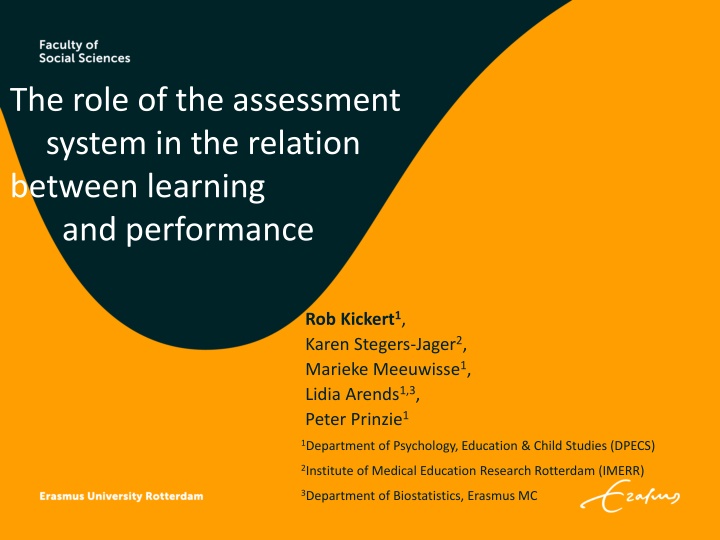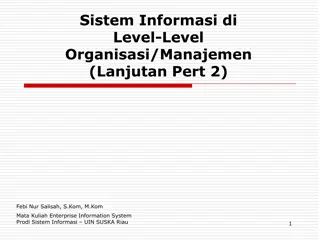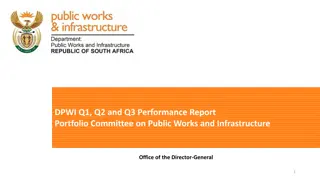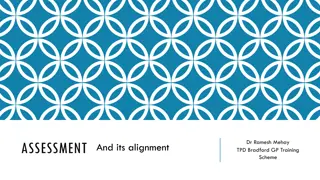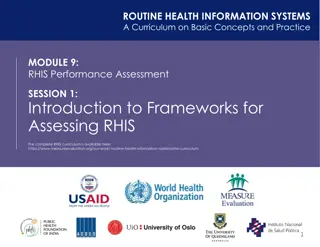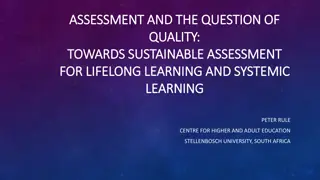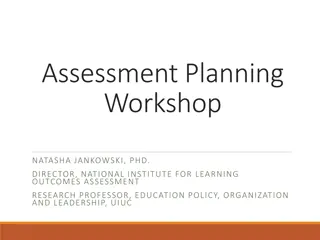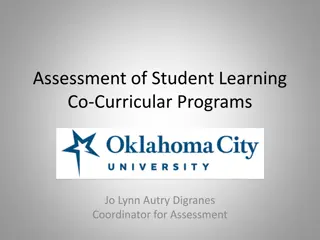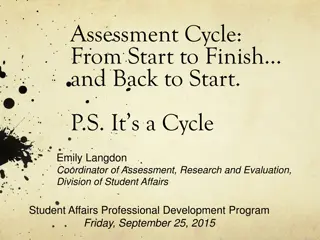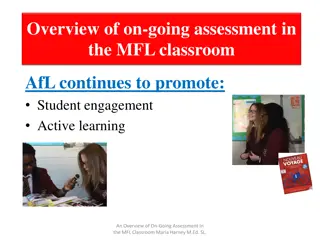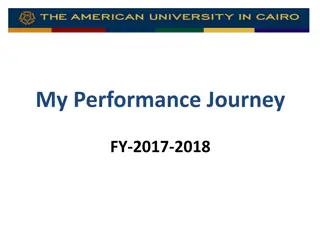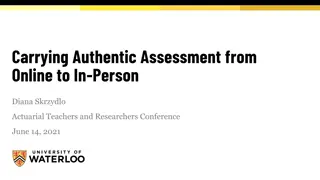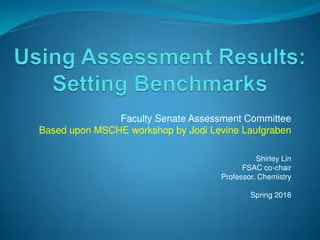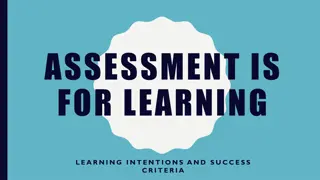The Role of Assessment Systems in Learning and Performance
The study explores the impact of assessment systems on academic progress and performance in a medical school setting. It compares the outcomes of students under old conjunctive assessment systems to those under new compensatory systems, analyzing differences in self-regulated learning, participation, and performance. The results indicate significant improvements in various aspects with the new system. Structural equation modeling was used to examine the relationships between different factors influencing academic success.
Download Presentation

Please find below an Image/Link to download the presentation.
The content on the website is provided AS IS for your information and personal use only. It may not be sold, licensed, or shared on other websites without obtaining consent from the author.If you encounter any issues during the download, it is possible that the publisher has removed the file from their server.
You are allowed to download the files provided on this website for personal or commercial use, subject to the condition that they are used lawfully. All files are the property of their respective owners.
The content on the website is provided AS IS for your information and personal use only. It may not be sold, licensed, or shared on other websites without obtaining consent from the author.
E N D
Presentation Transcript
The role of the assessment system in the relation between learning and performance Rob Kickert1, Karen Stegers-Jager2, Marieke Meeuwisse1, Lidia Arends1,3, Peter Prinzie1 1Department of Psychology, Education & Child Studies (DPECS) 2Institute of Medical Education Research Rotterdam (IMERR) 3Department of Biostatistics, Erasmus MC
A possible solution for disappointing academic progress: Renewed assessment system Old system New system Consequences (AD-policy) 40 EC s BA1 within 1 year, 60 EC s within 2 years 60 EC s BA1 within 1 year Performance standard/ Compensation 5.5 conjunctive 6.0 compensatory (2 x 5.0 5.49 permitted)
Model SRL, participation & Performance Stegers-Jager et al. (2012) Elaboration Organization Metacognition Deep learning strategies R2=0.50 Intrinsic goal orientation - + + Value Task value Time management Resource management R2=0.59 GPA Year 1 R2=0.47 Effort regulation + Self-efficacy + Participation R2=0.63 Lecture attendance Skills training attendance Guided indi- vidual study +
Methods Setting: Erasmus MC medical school, old (conjunctive) assessment system vs. new (compensatory) assessment system Participants: 2 cohorts first-year conjunctive students (N = 648) vs. 2 cohorts first-year compensatory-students (N = 529) Instrument: 8 subscales Motivated Strategies for Learning Questionnaire (MSLQ1;2) + items on participation3 + average grade for 9 first-year tests ( 7 grades)3 Analyses: Mean differences: MANOVA Structural model: Multi-group Structural Equation Modelling 1Pintrich et al., 1993 2Blom & Severiens, 2008 3Stegers-Jager, Cohen-Schotanus & Themmen, 2012
RQ1: mean differences in SRL, participation and performance? 4.66 < 4.89 Elaboration Organization Metacognition 4.27 < 4.60 Deep learning strategies Intrinsic goal orientation - + + Value 4.63 < 4.91 6.06 < 6.57 Task value Time management Year 1 average Resource management Gemiddelde cijfer jaar 1 grade 5.77 < 5.93 Effort regulation 4.91 < 5.33 + Self-efficacy + 4.89 < 5.08 Participation Legend: - Old - New - Significant difference Lecture attendance Skills training attendance Guided indi- vidual study 4.69 < 4.78 4.58 < 4.84 +
RQ2: similar structural relations? Elaboration Organization Metacognition Deep learning strategies R2=.45/.41 Intrinsic goal orientation -.12 / -.25* .67*/ .64* .71*/ .62* Value Task value Time management Resource management R2=.50/.39 Average grade Year 1 R2=.34/.32 .60*/.60* Effort regulation Self-efficacy .74*/.72* .61*/.62* Model fit: 2= 354.835, CFI = .947, SRMR = .048, RMSEA = .044 Participation R2=.55/.52 * p < .001; p < .05 Lecture attendance Skills training attendance Guided indi- vidual study .10*/.11*
Conclusions 1. Are mean SRL, participation and performance different under the new assessment system, compared to the old system? A. Higher grades under N=N: assessment drives learning (operant & cognitive) B. Motivation, learning strategies & participation generally higher under new assessment system 2. Have the relations between SRL, participation and performance remained the same under the new assessment system? Similar associations under both assessment systems Same behavior is related to performance Overall: Higher performance not explained by different relations, but by higher SRL & participation
In short Never underestimate the power of testing
Questions? r.kickert@fsw.eur.nl
References Blom, S., & Severiens, S. (2008). Engagement in self-regulated deep learning of successful immigrant and non-immigrant students in inner city schools. European Journal of Psychology of Education, 23, 41 58. doi:10.1007/BF03173139 CBS (2014). WO: studievoortgang, vooropleiding, studierichting, herkomstgroepering. Retrieved from http://statline.cbs.nl/. Cred , M., Roch, S. G., & Kieszczynka, U. M. (2010). Class Attendance in College A Meta-Analytic Review of the Relationship of Class Attendance With Grades and Student Characteristics. Review of Educational Research, 80, 272 295. doi:10.3102/0034654310362998 Pintrich, P. R., & de Groot, E. V. (1990). Motivational and self-regulated learning components of classroom academic performance. Journal of Educational Psychology, 82, 33 40. doi:10.1037/0022-0663.82.1.33 Pintrich, P. R., Smith, D. A. F., Garcia, T., & Mckeachie, W. J. (1993). Reliability and Predictive Validity of the Motivated Strategies for Learning Questionnaire (Mslq). Educational and Psychological Measurement, 53, 801 813. doi:10.1177/0013164493053003024 Schmidt, H. G., Cohen-Schotanus, J., Van der Molen, H. T., Splinter, T. A. W., Bulte, J., Holdrinet, R., & Van Rossum, H. J. M. (2009). Learning more by being taught less: a time-for-self- study theory explaining curricular effects on graduation rate and study duration. Higher Education, 60, 287 300. doi:10.1007/s10734-009-9300-3 Stegers-Jager, K. M., Cohen-Schotanus, J., & Themmen, A. P. N. (2012). Motivation, learning strategies, participation and medical school performance. Medical Education, 46, 678 688. doi:10.1111/j.1365-2923.2012.04284.x
rassessmentsystem-average grade = .28 The strategic student? New (compensatory) Old (conjunctive) Average grade M = 6.06, sd = .937 N = 648 73.8 % 5.5 Average grade M = 6.57, sd = .809 N = 529 77.9% 6.0
Example items Construct Example item Task value I am very interested in the content area of this course Intrinsic goal orientation In a class like this, I prefer course material that arouses my curiosity, even if it is difficult to learn Self-efficacy I expect to do well in this class Elaboration I try to relate ideas in this subject to those in other courses whenever possible Organisation I make simple charts, diagrams, or tables to help me organize course material Metacognition Before I study new course material thoroughly, I often skim it to see how it is organized. Effort regulation I work hard to do well in this class even if I don't like what we are doing Time management I make good use of my study time for this course Participation skills training What percentage of the skills trainings did you attend?
Raw results SRL construct M (sd) Old cohorts M (sd) New cohorts P-value Effect size: Cohen s d Value 5.77 (.73) 5.93 (.71) < .001 .22 Intrinsic goal ori ntation 5.74 (.73) 5.79 (.72) n.s. - Self-efficacy 4.89 (.84) 5.08 (.80) < .001 .23 Metacognition 4.27 (.80) 4.60 (.83) < .001 .40 Elaboration 4.85 (.87) 4.86 (.90) n.s. - Organisation 4.66 (1.16) 4.89 (1.23) .001 .19 Effort regulation 4.91 (1.06) 5.33 (.97) < .001 .41 Time- & study- environment management 4.63 (1.04) 4.91 (1.01) < .001 .27
Raw results Construct M (sd) Old cohorts M (sd) New cohorts P-value Effect size: Cohen s d Participation lectures 4.69 (.67) 4.78 (.62) .016 .14 Participation skills trainings 4.58 (.67) 4.84 (.47) < .001 .45 Participation guided individual study 4.10 (1.15) 4.06 (1.18) n.s. Average grade 6.06 (.94) 6.57 (.81) < .001 .57
Limitations - Observational research - Include early drop-outs? - Altered selection procedure: 50% weighted lottery 20%
